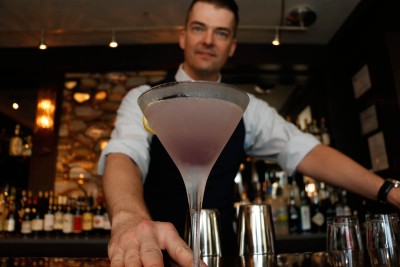
Following recent changes to Boston’s liquor licensing process, Boston City Councilor Ayanna Pressley is continuing to push for change.
In 2013, Pressley succeeded in returning control of liquor licensing to the city from the Commonwealth. The following year, 75 new liquor licenses were allocated to Boston businesses, said Boston City Councilor Michelle Wu.
“The city’s number of liquor licenses is controlled by the state. There is a cap on it based on population, and therefore, Boston has far fewer liquor licenses than there are restaurants that want them,” Wu said. “The part of this that complicates things is you can transfer a liquor license privately.”
The Alcoholic Beverages Control Commission controls retailing and alcoholic beverage licensing on a state level, according to the ABCC website. After the Local Licensing Authority approves a store or restaurant license in the city that wants to sell alcohol, ABCC will also approve it, the website states.
Wu added that when a restaurant wants to open and desires a liquor license, they must buy a liquor license from a restaurant that is closing down. The cost to obtain a license can range from $250,000 to $400,000, she said.
“What Pressley has been working on [is] trying to get more licenses for the city. She got control of the city’s licensing board back to the city,” Wu said. “The goal is to make it such that you can open a restaurant or open a business and bring jobs into the neighborhood, [and] there aren’t huge barriers into entry.”
Wu said that smaller restaurants in particular might struggle to get started with the current state of licensing.
“When a business is opening up, if a liquor license is going to cost them hundreds of thousands of dollars, it’s a huge barrier to entry and it keeps out a lot of the smaller businesses,” she said.
Wu said that she feels that Boston should have control over liquor licensing, and that it is important for new restaurants to have every opportunity to open and help neighborhoods. She added that another goal is to not force out long-time residents of Boston.
“Restaurants are foundational to active neighborhoods and really are often the first business to draw people in,” Wu said. “The goal of this is to make sure that our residents in Boston who have spent so much time and built the neighborhoods in the community aren’t displaced by movements, but benefit from them.”
Several residents said they would like to see changes in Boston’s liquor licensing policies.
Meg Pierce, 31, of said that Boston differs from the rest of Massachusetts, and therefore should function differently with regard to state bureaucracy.
“I definitely think it [the city] should have control over liquor permitting and shouldn’t have to face limitations put in place by the state legislature,” Pierce said.
Elizabeth Martin, 29, of South Boston said that she thinks Massachusetts should be able to sell liquor any day of the year.
“Stores and restaurants should have the freedom to do whatever they want, as long as they’re reasonable about it,” she said. “If Boston having control of liquor permitting allows for that, then I think it’s a good thing.”
Annette Silbert, 66, of said she has firsthand experience with the difficulty in obtaining a license.
“I know, after working 16 years in the restaurant industry, that it is difficult to obtain a liquor license,” she said. “I suppose it would benefit emerging restaurant owners and help them establish their business if they can secure a license more easily if the city of Boston has control.”






















































































































